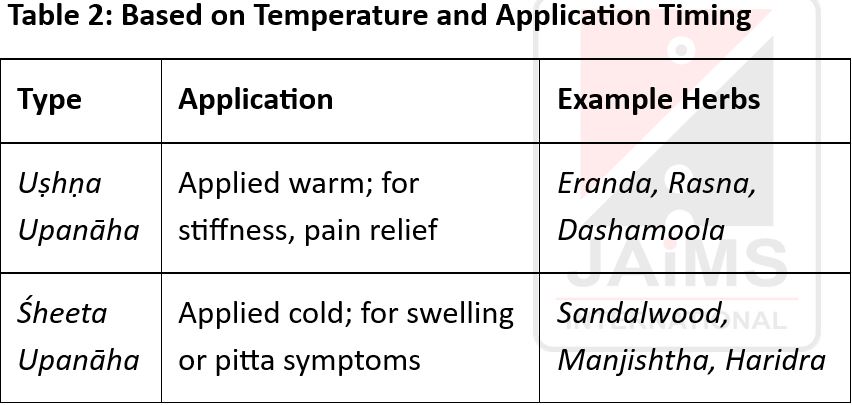A Review on Role of Upanāha Sveda in Musculoskeletal Pain arising from Sedentary Lifestyle
DOI:
https://doi.org/10.21760/jaims.10.9.26Keywords:
Pain Management, Lifestyle Disorders, Upanāha SvedaAbstract
In Ayurveda the first step in pain management is Nidanparivarjan i.e. to find and treat the cause. The most effective approach is a combination of medications, therapies and lifestyle changes. Modern medicine primarily offers symptomatic relief through analgesics, steroids which may provide temporary benefits but often lead to side effects or recurrence. In this context, Ayurveda presents a holistic and sustainable solution through interventions like Upanāha Sveda, a traditional Snigdha Sveda therapy. Upanāha Sveda is a powerful, classical Ayurvedic therapy that addresses the root cause of many lifestyle-related musculoskeletal disorders. Its ability to pacify Vāta, reduce inflammation, nourish tissues, and restore balance makes it highly effective for those leading sedentary or stressful lives. Regular application can prevent progression to more severe conditions and improve quality of life. This paper aims to explore the therapeutic efficacy of Upanāha Sveda in managing musculoskeletal pain associated with sedentary lifestyle habits and to highlight its relevance as a sustainable, non-invasive intervention.
Downloads
References
Sharma RK, Dash B. Charaka Samhita of Agnivesha, Siddhi Sthana. Varanasi: Chowkhamba Sanskrit Series; 2012. p. 88.
Srikantha Murthy KR. Ashtanga Hridaya of Vagbhata, Sutra Sthana. Varanasi: Chaukhambha Krishnadas Academy; 2010. p. 24.
Sharma RK, Dash B. Charaka Samhita of Agnivesha, Sutra Sthana, Chapter 14, Verse 39. Varanasi: Chowkhamba Sanskrit Series; 2012. p. 288.
Sharma RK, Dash B. Charaka Samhita of Agnivesha, Siddhi Sthana, Chapter 9, Verse 88. Varanasi: Chowkhamba Sanskrit Series; 2012. p. 730.
Sharma RK, Dash B. Charaka Samhita of Agnivesha, Chikitsa Sthana, Chapter 28, Verse 158. Varanasi: Chowkhamba Sanskrit Series; 2012. p. 636.
Tillu G, Bhutani A, Patwardhan B. Dashamoola Upanaha for Sandhigata Vata: A clinical trial. AYU. 2021;42(1):20–6.
Rao N, Nampoothiri V. A clinical study on the efficacy of Nirgundi Upanaha in cervical spondylosis. Ancient Sci Life. 2018;37(3):142–7.
Singh R, Sharma P, Jain R. Pharmacological actions of Dashamoola and its ingredients: A review. Int J Ayurveda Res. 2020;11(2):89–95.
Sharma PV. Dravyaguna Vijnana. Vol. 2. Varanasi: Chaukhambha Bharati Academy; 2014. p. 350–6.
Chandra S, Kumar A, Singh N, et al. A review on Nirgundi (Vitex negundo Linn.): A potential medicinal plant. J Drug Deliv Ther. 2020;10(4):238–42.
Prasad PV, Bhattacharya SK. Anti-inflammatory and analgesic activity of Eranda Taila in experimental models. J Res Ayurveda Siddha. 2006;27(1):23–9.
Sharma S. Clinical efficacy of Upanaha Sweda in Katigraha – A case study. Int J Ayurveda Pharm Res. 2017;5(4):45–8.

Published
How to Cite
Issue
Section
License
Copyright (c) 2025 Akshaya Patil, Sakshi Bakshi

This work is licensed under a Creative Commons Attribution 4.0 International License.














